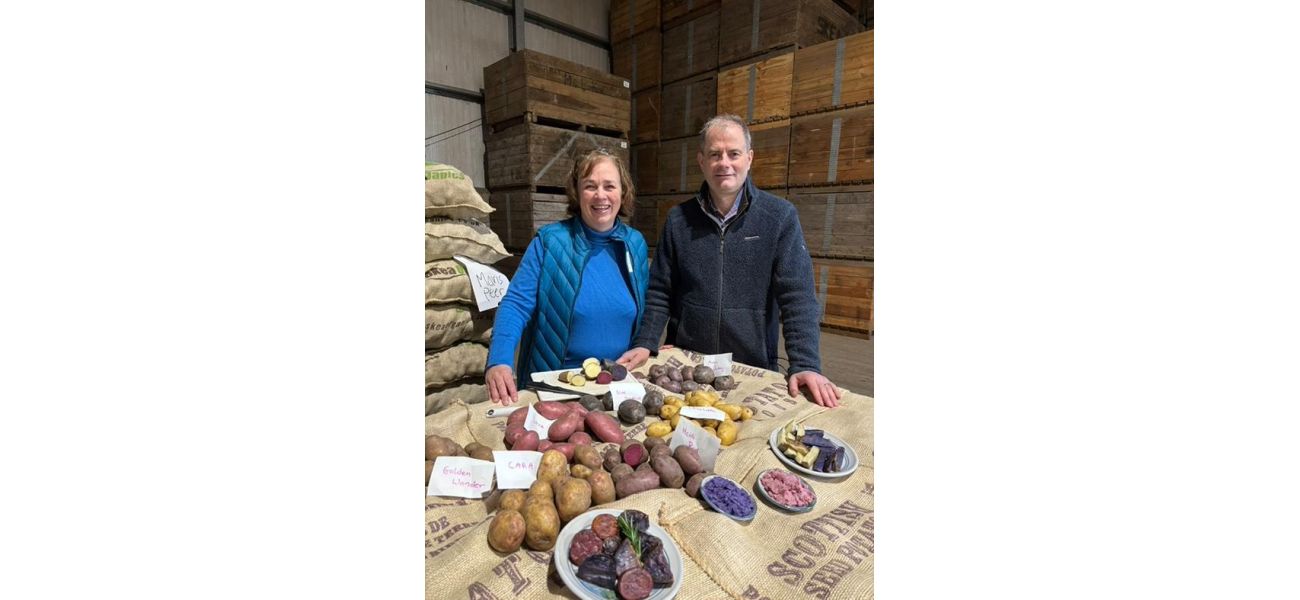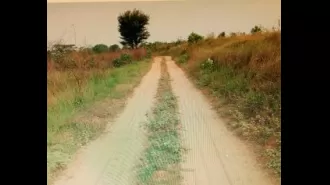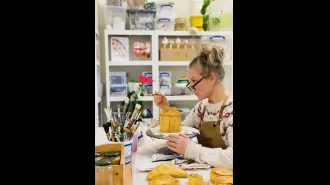A discussion with Amy and Andrew Skea, creators of the Potato House.
Amy and Andrew Skea are on a mission to bring back the forgotten heritage potatoes, the colorful and knobbly varieties that our grandparents used to eat.
January 6th 2025.

Most of us are familiar with the popular potato varieties like King Edwards and Charlottes, but have you ever wondered about the tatties of our past? For Andrew and Amy Skea, who are potato growers, their goal is to revive our love for heritage potatoes - the ones with vibrant colors and unique shapes that were a staple in our grandparents' diets 50 years ago, but have gradually lost their popularity over time.
Andrew's grandfather started harvesting seed potatoes in Glenisla, Perthshire back in the 1960s. Following in his footsteps, Andrew founded Skea Organics in 2010, a business that focuses on producing and supplying seed potatoes. As the years went by, Andrew and Amy noticed a growing demand for smaller orders from passionate gardeners and allotment growers. This inspired them to create Potato House, a division of their business dedicated to providing these growers with seed potatoes that have distinct flavors and characteristics.
Their collection now includes over 80 varieties of potatoes, including some rare heritage ones such as Edzell Blue, Shetland Black, and Arran Victory, which was bred on the Isle of Arran to commemorate the end of World War 1. Andrew and Amy take great pride in preserving these old varieties, some of which are now only grown by a handful of farmers.
"We primarily produce seed potatoes and supply them to gardeners and allotment holders through our website," Amy explains. "Many gardeners are looking to try out different varieties that are not commonly found in supermarkets, and they turn to us for our wide range of options. Some even have specific memories of their grandparents growing certain types of potatoes and come to us in search of those."
The heritage potatoes, which date back to before 1950, remind us of "what a potato should taste like," according to Amy. "They have an earthy flavor that is absent in modern varieties, which are bred to be resistant to diseases but have lost their taste in the process. We have become so used to seeing only white, round potatoes in supermarkets that we forget how diverse and flavorful potatoes used to be."
"People absolutely love the taste of heritage potatoes," she continues. "Many of them say that these potatoes have a distinct earthiness that reminds them of how potatoes used to taste. And the best part is, cooking these potatoes is just as easy as cooking any other type. It all depends on the type of potato, not its color. So, don't be afraid to give these varieties a try!"
Interestingly, most of the potato breeders in the late 18th and early 19th century were Scottish and based their breeding programs in Scotland. "Scotland is an ideal place for growing seed potatoes because the cooler maritime climate reduces the risk of viral diseases," Amy shares. "These diseases are often spread by small insects called aphids, which can easily transport the virus across potato crops. But in Scotland, the cooler climate in both summer and winter months delays the development of aphids."
Aside from their passion for growing and supplying heritage potatoes, Andrew and Amy have also ventured into the world of recipes. They recently acquired a recipe site dedicated entirely to potatoes, with over 230 recipes featuring potatoes as the main ingredient. You can check it out at www.potatohouse.co.uk.
If you want to learn more about their journey and other producers in Scotland, make sure to read the latest issue of Scottish Field. You can also subscribe to their newsletter to stay updated on all things related to Scottish produce.
Andrew's grandfather started harvesting seed potatoes in Glenisla, Perthshire back in the 1960s. Following in his footsteps, Andrew founded Skea Organics in 2010, a business that focuses on producing and supplying seed potatoes. As the years went by, Andrew and Amy noticed a growing demand for smaller orders from passionate gardeners and allotment growers. This inspired them to create Potato House, a division of their business dedicated to providing these growers with seed potatoes that have distinct flavors and characteristics.
Their collection now includes over 80 varieties of potatoes, including some rare heritage ones such as Edzell Blue, Shetland Black, and Arran Victory, which was bred on the Isle of Arran to commemorate the end of World War 1. Andrew and Amy take great pride in preserving these old varieties, some of which are now only grown by a handful of farmers.
"We primarily produce seed potatoes and supply them to gardeners and allotment holders through our website," Amy explains. "Many gardeners are looking to try out different varieties that are not commonly found in supermarkets, and they turn to us for our wide range of options. Some even have specific memories of their grandparents growing certain types of potatoes and come to us in search of those."
The heritage potatoes, which date back to before 1950, remind us of "what a potato should taste like," according to Amy. "They have an earthy flavor that is absent in modern varieties, which are bred to be resistant to diseases but have lost their taste in the process. We have become so used to seeing only white, round potatoes in supermarkets that we forget how diverse and flavorful potatoes used to be."
"People absolutely love the taste of heritage potatoes," she continues. "Many of them say that these potatoes have a distinct earthiness that reminds them of how potatoes used to taste. And the best part is, cooking these potatoes is just as easy as cooking any other type. It all depends on the type of potato, not its color. So, don't be afraid to give these varieties a try!"
Interestingly, most of the potato breeders in the late 18th and early 19th century were Scottish and based their breeding programs in Scotland. "Scotland is an ideal place for growing seed potatoes because the cooler maritime climate reduces the risk of viral diseases," Amy shares. "These diseases are often spread by small insects called aphids, which can easily transport the virus across potato crops. But in Scotland, the cooler climate in both summer and winter months delays the development of aphids."
Aside from their passion for growing and supplying heritage potatoes, Andrew and Amy have also ventured into the world of recipes. They recently acquired a recipe site dedicated entirely to potatoes, with over 230 recipes featuring potatoes as the main ingredient. You can check it out at www.potatohouse.co.uk.
If you want to learn more about their journey and other producers in Scotland, make sure to read the latest issue of Scottish Field. You can also subscribe to their newsletter to stay updated on all things related to Scottish produce.
[This article has been trending online recently and has been generated with AI. Your feed is customized.]
[Generative AI is experimental.]
0
0
Submit Comment





